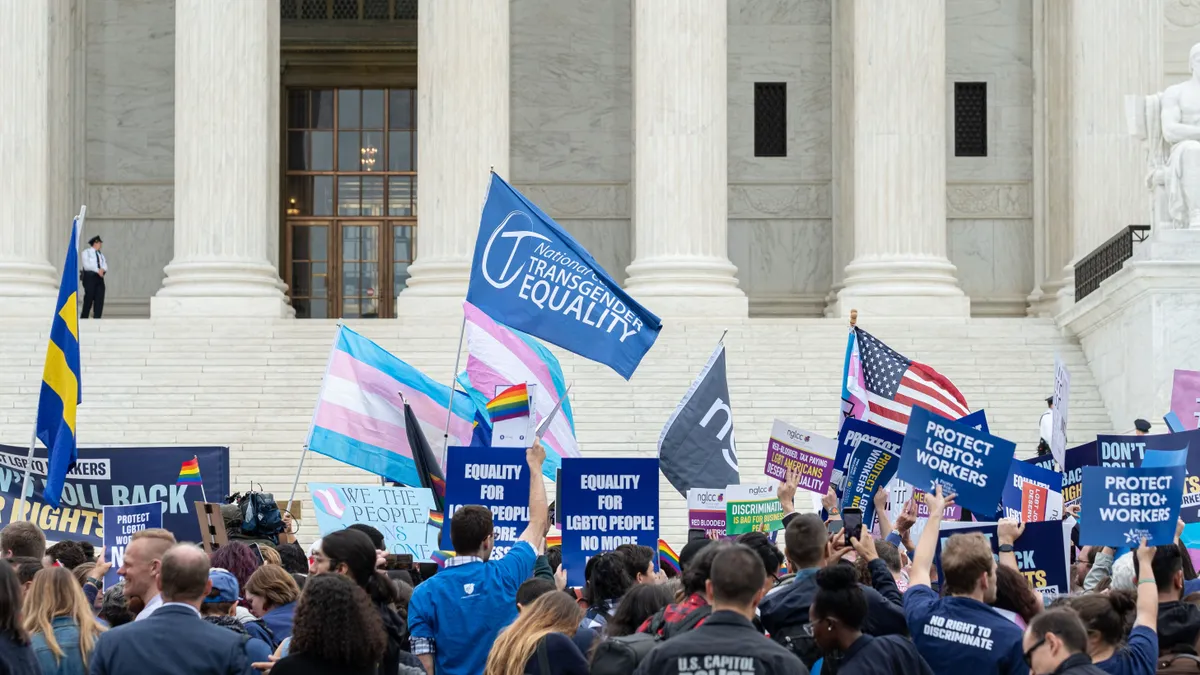WASHINGTON — As counsel presented oral arguments for a trio of cases before the U.S. Supreme Court Tuesday morning, one word — sex — drove the discussion. The justices have agreed to consider whether the protected category of sex as provided by Title VII of the Civil Rights Act of 1964 includes sexual orientation and gender identity.
But as employers anticipate the court's rulings in both the consolidated cases Bostock v. Clayton County, Georgia and Altitude Express, Inc. v. Zarda, as well as Harris Funeral Homes v. EEOC, they may want to remember that the decision the justices hand down will not necessarily change their employment practices, attorneys told HR Dive.
It's worth noting what Stanford Law School Professor Pamela Karlan brought up as she argued on behalf of the gay men named in Bostock and Zarda: "85% of American employers are not covered by Title VII at all," she said. The same is true for most American employees, Seyfarth Shaw senior counsel Lawrence Lorber told HR Dive in an interview. Regardless of how the High Court comes down on the question of sex under Title VII, the majority of employers can choose how they address LGBTQ workplace protections, at least under federal law.
Tuesday's central question: How is 'sex' defined?
In the opening minutes, Associate Justice Ruth Bader Ginsburg challenged Karlan, counsel for the petitioner in Bostock and the respondents in Zarda, as to how Karlan could reckon with a central point: that the U.S. Congress could not have had the issue of sexual orientation in mind when it wrote the Civil Rights Act of 1964.
Karlan countered by arguing that High Court had "recognized again and again forms of sex discrimination that were not in Congress' contemplation in 1964," pointing specifically to the court's precedent set in the landmark 1989 case Price Waterhouse v. Hopkins finding that gender stereotyping can amount to sex discrimination. Thus, the court would not need to update Title VII, she said, but "read the words as they were understood then" and conclude that Congress intended to ensure that neither men nor women were disadvantaged.
This line of argument drew an inquiry from Associate Justice Samuel Alito, who said Karlan was "trying to change the meaning of what Congress understood sex to mean." Karlan challenged him: "I'm simply saying that if a man and a woman both wanted to sew and you fire the man who loves sewing and you don't fire the woman who loves sewing, that's [sex] discrimination, pure and simple," she said, referencing the 1970s case Smith v. Liberty Mutual Insurance Company.
David Cole, counsel for former funeral home employee Aimee Stephens, made a similar argument. Cole said Stephens' employer discriminated against her on the basis of sex in part because Stephens failed to conform to the employer's stereotypes about how men and women should behave. He compared this treatment to that experienced by the employee in Hopkins, adding Stephens' employer "fired her for contravening a sex-specific expectation that applies only to people assigned male sex at birth; namely, that they live and identify as a man for their entire lives."
Associate Justice Neil Gorsuch had several notable lines of inquiry with attorneys in both sections of Tuesday's session, including one with Cole over the broad social impact that a ruling on the issue of transgender identity discrimination would have. Gorsuch questioned whether the court would need to consider the "massive social upheaval" that would follow, including the need to change organizational policies around bathrooms and dress codes.
Cole replied that various federal courts have ruled that transgender discrimination is illegal for 20 years without a subsequent drop-off in dress codes and sex-specific restrooms in society.
Later, when speaking to Jeffery Harris, the counsel opposite Karlan, Gorsuch began a line of questioning about the "but for" causation standard in Title VII, saying that he understood Karlan's argument to mean that Title VII has "a more generous causation standard" with respect to determining whether an employee is discriminated against on the basis of sex or their sexual orientation. Sexual orientation may have been in play in both Bostock and Zarda, Gorsuch said, "but isn't sex also in play here because of the change of the first variable? And isn't that enough?"
The federal government was represented in the proceedings by U.S. Solicitor General Noel Francisco, who argued that resolving the Title VII issue judicially would undermine Congressional process. "I think it is important to allow the democratic processes to resolve these issues so we have a stable resolution of the issue and one that takes into account what everybody would agree are legitimate interests on all sides," Francisco said.
Did other workplace-specific topics come into play?
Justices repeatedly discussed the issue of bathroom use Tuesday. Associate Justice Sonia Sotomayor questioned Cole about how the court should analyze a situation in which a transgender woman decided to use a women's bathroom despite some women feeling uncomfortable or intruded upon because someone with male characteristics used the same bathroom.
Cole replied that this was not the question being asked in Stephens, but said that were he litigating such a case, "the question would be, does imposing that restroom policy, which is obviously because of sex, impose a discriminatory injury on an individual." Karlan responded similarly.
Harris used the example of a factory workplace, in which workers shower after work to clean off hazardous materials, to illustrate issues with the use of comparators in Karlan's case. A man who used the women's shower would not be similarly situated to a woman using the woman's shower, Harris argued, but to a woman using the man's shower. "Otherwise you're loading the dice or you're not looking at similarly situated people."
Uniform policies also received attention during oral arguments, with one such policy being at the center of the Harris case. Like bathrooms, the subject of uniforms was raised in the context of creating comparators for the employees involved. John Bursch, counsel for Harris Funeral Homes, argued that Stephens' counsel's use of a comparator between a man violating a dress code with a woman who follows the dress code was incorrect. Comparing a transgender person to a non-transgender person, "proves [Stephens' counsel] is adding a different classification into the statute that Congress has not added," Bursch said.
Karlan answered the question of uniforms by articulating the test she proposed to the court. "My test says that you have treated the people differently because of sex," Karlan said. "Then you get to what I've said, which is you have to ask whether a reasonable person under these circumstances would be injured by the imposition of the particular sex-specific world."
How much change could the justices effect?
Regardless of the outcome of these arguments, it will be "monumental," according to Haynes and Boone Partner Jason Habinsky. "If they decide that the rights are not protected, it'll deal a crushing blow to the community and really have a longstanding effect confirming that the community doesn't have these protections in the workplace," Habinsky told HR Dive in an interview preceding the oral arguments.
But 20 states and the District of Columbia have enacted laws that address discrimination based on sexual orientation and gender discrimination. "In those parts of the country, employers should already be dedicated to protecting those rights. A decision favoring protection shouldn't impact that," Habinsky said. "For those parts of the country that don't have legislation, it'll be a critical and substantial decision." Should the Supreme Court issue a ruling that denies LGBTQ workers protection under Title VII, it may spur more state and local legislation.
Of course, employers may adopt protections for LGBTQ applicants and employees regardless of what the justices decide. "If they want to take action now and have a policy, then they should go ahead and do it," Lorber said. He noted, however, that employers should proceed with caution as they go about this. "I always advise clients, to be blunt about it, less is more," he said. "Make sure the policies are necessary — don't get into the issues."























